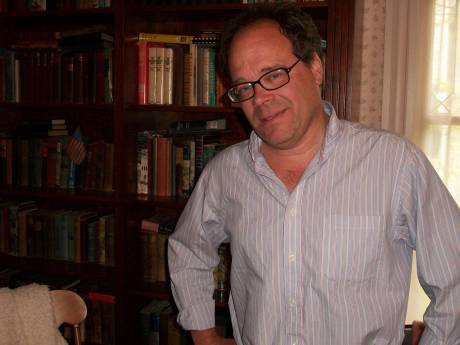Bill Kauffman (195 9- ) is a journalist closely affiliated with the American paleoconservative movement. Kauffman began his career as an aide to Senator Patrick Moynihan, a job that he calls an “anarchist-making experience”. Kauffman went on to write for numerous publications including Reason, Liberty, Chronicles, The American Conservative, The Front Porch Republic, and, CounterPunch. Much of Kauffman’s writing focuses on topics such as radical decentralization, the importance of community, and the antiwar roots of American conservatism. Kauffman blends the political instincts of a libertarian anarchist with a traditionalist conservative emphasis on community and culture.
9- ) is a journalist closely affiliated with the American paleoconservative movement. Kauffman began his career as an aide to Senator Patrick Moynihan, a job that he calls an “anarchist-making experience”. Kauffman went on to write for numerous publications including Reason, Liberty, Chronicles, The American Conservative, The Front Porch Republic, and, CounterPunch. Much of Kauffman’s writing focuses on topics such as radical decentralization, the importance of community, and the antiwar roots of American conservatism. Kauffman blends the political instincts of a libertarian anarchist with a traditionalist conservative emphasis on community and culture.
1. “Perhaps no political term is quite so misunderstood as “anarchy.” In the popular press, it is a synonym for disorder and chaos, not to mention looting and pillage: countries like Haiti are always being “plunged into anarchy.” The anarchist, meanwhile, is frozen into a late-nineteenth-century caricature: he is furtive, hirsute, beady-eyed, given to gesticulation, gibberish, and, most of all, pointless acts of violence. Yet anarchy, according to most of its proponents through the years, is peaceable, wholly voluntary, and perhaps a bit utopian.”
2. It [American regionalism] died at Pearl Harbor. War kills places as well as people.
3. My wanderings had taken me from the populist flank of liberalism to the agrarian wing of Don’t Tread on Me Libertarianism to the peace-and-love left wing of paleoconservatism, which is to say that I had been always on the outside — an outsider even among outsiders — attracted to the spirit of these movements but never really comfortable within them, never willing even to call myself by their names. When asked, I was simply an Independent. A Jeffersonian. An anarchist. A (cheerful!) enemy of the state, a reactionary Friend of the Library, a peace-loving football fan. And here, as Gerry and the Pacemakers once sang, is where I’ll stay.
Look Homeward America: In Search of Reactionary Radicals and Front-Porch Anarchists.
4. I cannot think of the libertarians without laughing, and yet, on the great issue of the day, they were dead right. They diagnosed the twentieth century’s homicidal malady: the all-powerful state, which in the name of the workers of the world, the master race, and even making the world safe for democracy had slaughtered tens, nay hundreds, of millions of human beings whose misfortune it had been to run afoul of ideologues wielding state power.
Look Homeward America.
5. I wish to testify that in my best moments I am not aware of the existence of the government. Though I respect and feel myself dignified by the principles of the Declaration and the Constitution, I do not remember a day when the thought of the government made me happy, and I never think of it without the wish that it might become wiser and truer and smaller than it is.
Look Homeward America.
6. Stay with your family. Your tribe. Your neighborhood. Your town. As Joe Strummer of The Clash hummed, “It’s up to you not to heed the call-up.” Don’t feed the war machine. You are not expendable, in your family’s eyes or in God’s. The soft young men in three-piece suits who write their little pamphlets proving that whatever slaughter our government is currently engaged in is a “just war” should be laughed back to the seminaries they quit. Thou shalt not kill means us, too.
Look Homeward America.
7. There are two Americas: the televised America, known and hated by the world, and the rest of us. The former is a factitious creation whose strange gods include HBO, accentless TV anchor people, Dick Cheney, reruns of Friends, and the National Endowment for Democracy. It is real enough—cross it and you’ll learn more than you want to know about weapons of mass destruction—but it has no heart, no soul, no connection to the thousand and one real Americas that produced Zora Neale Hurston and Jack Kerouac and Saint Dorothy Day and the Mighty Casey who struck out.
Look Homeward America.
8. There is nothing conservative about the American Empire. It seeks to destroy-which is why good American conservatives, those loyal to family and home and neighborhood and our best traditions, should wish, and work toward, its peaceful destruction.
9. I am of the other America, the unseen America, the America undreamt of by the foreigners who hate my country without knowing a single thing about it. Ours is a land of volunteer fire departments, of baseball, of wizened spinsters who instead of sitting around whining about their goddamned osteoporosis write and self-publish books on the histories of their little towns, of the farmwives and grain merchants and parsons and drunkards who made their places live.
10. I heard much talk of the need for libertarian conservatives and anti-globalist leftists to work together. There is a sense that the old categories, the old straitjackets, must be shed. When Reverend Matchstick preaches that we need decentralism because communities that ban genetically modified food must have the power to enforce those bans, he is speaking a language that pre-imperial conservatives will recognize—the language of local control. Russell Kirk would understand. When the “Vermont nationalist” CEO of a consulting firm insists that Vermont should have the right to determine where (and where not) its national guard is deployed, I hear an echo of the Old Right. Why should the Vermont National Guard be shipped overseas to fight the Empire’s wars?

